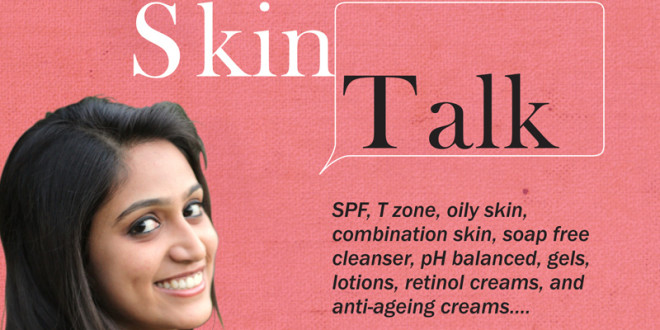Articles, advertisements and people today are full of Skin Talk
SPF, T zone, oily skin, combination skin, soap free cleanser, pH balanced, gels, lotions, retinol creams, and anti-ageing creams….
Don’t know what these terms mean? Too shy to ask?
Join us as we decode these terms so you can treat your skin better!
Skin Types are broadly divided into:
Oily skin tends to be shiny with enlarged pores, and is prone to blackheads and blemishes. You might experience some tightness.
Combination/normal skin has medium pores, a smooth and even texture, good circulation, healthy colour, may tend toward dryness on the cheeks while being oily in the T-zone (forehead and nose areas, which form a T on the face.)
Sensitive skin tends to be thin and delicate, with fine pores. It flushes easily, is prone to broken capillaries, is frequently allergic and can be rashy.
Dry skin feels tight, especially after cleansing. You have a tendency towards fine wrinkles, flaking and red patches. In women of colour, skin may appear ashy or dull from dead-skin buildup.
Ageing or sun-damaged skin also feels tight with visible wrinkles, slack skin tone — especially around the cheeks and jawline, with leathery texture and broken capillaries.
Choose a cleanser
Our skin is slightly acidic in nature. All soaps are alkaline; therefore soaps are harsh on your skin, especially on the face. Use a pH balanced and soap-free face wash for your face. Wash first with warm water to unclog the pores, and rinse with cold water to close the pores.
Choose a Moisturizer
Whatever your skin type, you need moisturizer. Use your moisturizer specific to your skin type. Try to get products which have ingredients like lactobionic acid or hyaluronic acid, which are more hydrating. People with oily skin can use a gel-based or lotion-based moisturizer (water-based, so less likely to cause greasiness of the skin or acne breakouts),
and those with dry skin can use creams which have an oil base. Always look for a product which says non-comedogenic (such products will not cause blackheads) especially if you are prone to acne.
The number-1 cause of wrinkles is sun damage, so it’s important to use sunscreen from your early years, even in winter and on cloudy days.
Use a sunscreen
Limit exposure to the sun when it is the strongest, between 11 am and 4pm. A rule to remember: if your shadow is smaller than you, you need to be indoors.
Opt for sunscreens from medical companies, as their sunscreen Sun Protection Factor (SPF) and Ultraviolet A (UVA) ratings are standardized. The SPF of a sunscreen determines how many minutes you can spend in the sun without getting sunburned. This is a measure of protection offered by the sunscreen. The UVA factor determines protection from UVA rays of the sun, which cause wrinkling of the skin over time.
SPFs need to be applied 30 minutes before sun exposure because the sunscreens have photo- protective chemicals which need to interact with the skin before they become active. Reapply the sunscreen every three to four hours if you are still out in the sun.
Some sunscreens which have zinc make you look darker. Cosmetically elegant and efficient SPFs are available; look for at least 26 SPF.
Do you need an anti-aging cream?
All of us age from the day we are born; till our twenties this ageing is manifest as growth. Ageing in the skin is a combination of loss of collagen (a supporting protein) and hyaluronic acid. However, collagen and hyaluronic acid molecules are too large in size to penetrate the skin when applied in cream forms.
If you are above 30 years of age, choose an anti-ageing cream which has Retinol (Vitamin A). This molecule helps regenerate collagen. However, you need to use the cream only 2 – 3 nights a week. Increase the dose to every night if you are above 40. If you are a smoker, or work in highly stressful jobs, or have significant sun exposure during travel or work, add on a Vitamin C cream in the morning. Vitamin C creams are highly unstable; choose creams which are recommended by your dermatologist.
Save your skin and hair
- Smoking. Don’t do it
- Stress. Not good for skin
- Sleep. Is good for skin
- Sunshine. Limit exposure when it’s strongest
– Dr. Rasya Dixit
 Juliet Thomas Christian Articles for Young Women
Juliet Thomas Christian Articles for Young Women


